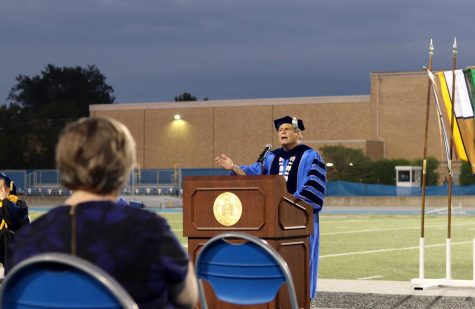Weekly News Roundup

Jeff Mandell is one of the rare digital caricature artists in the world.
Mandell uses a digital quick sketch program and a digital tablet to create his caricatures.
Students can get a digital caricature today in the Martin Luther King Jr. University Union Food Court as part of University Board’s “Rush Hour: Let’s Leap Together.”
The event will also offer free food and games, and last from 11 a.m. to 2 p.m.
“Rush Hour” events are intended to target all students of the Eastern community.
“Since many off-campus students don’t attend events like ‘Up All Night’, we’re trying to give them the opportunity to attend events while they are on campus since they pay student fees too,” said Andrew Hubbard, Special Events Coordinator of UB.
“The location is in a high traffic area so there should be no problem with the amount of participants,” he said.
UB members booked Mandell during the National Association of Campus Activities.
“With the stigma of Leap Year coming around every so often and being considered ‘special,’ we decided to bring a ‘special’ person,” Hubbard said.
Leap Day comes usually once every four years.
It started as a result of the Julian calendar, invented in 45 B.C., said physics professor Dan Linton.
Because of the calendar’s mathematical errors, the Gregorian calendar was formed in 1582 to reduce the average length of the leap year, he said.
Today, calendars are used in lunar years as an attempt to synchronize the year’s length to the phases of the moon.
The intention of leap year is to keep seasons on a schedule.
It also helps farmers calculate their harvest and keeps days organized.
“Unfortunately, 12 lunar months requires only 354 days, so several of the lunar calendars (including the Chinese calendar and the Jewish Festival calendar) employ the practice of inserting a ‘leap month’ into the calendar every two to three years to keep approximate synchronization with the seasons,” Linton said.
As technology advanced, scientists discovered that the Earth does not rotate around the sun once every 365 days.
“In fact, the Earth rotates about 365.24 times in one year,” said Bill Wolf, Astronomy Club member.
“To compensate, every fourth year we add an extra day to February, so that our seasons don’t go off schedule,” he said.
Weekly News Roundup
For the news from campus, the city of Charleston and Eastern athletics, www.dennews.com presents the Weekly News Roundup featuring the vocal talents of WEIU’s John Twork.



















![[Thumbnail Edition] Senior Foward Macy McGlone, getsw the ball and gets the point during the first half of the game aginst Western Illinois University,, Eastern Illinois University Lost to Western Illinois University Thursday March 6 20205, 78-75 EIU lost making it the end of their season](https://www.dailyeasternnews.com/wp-content/uploads/2025/03/WBB_OVC_03_O-1-e1743361637111-1200x614.jpg)
















































